By Lucy Komisar
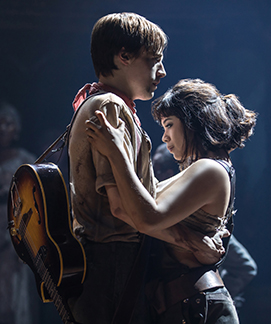
“Hadestown,” written and composed by Ana¯s Mitchell and directed by Rachel Chavkin, is a very radical play. It takes the audience to Hell, which is peopled by oppressed workers who have been indoctrinated to fear those who are poorer. Though that is probably not how it is described in the reviews you have read in mainstream media. It won the Tony for best musical play. But you probably have no idea what it is about. I call it the censorship of cultural ideas.
The mainstream critics have focused on the personal story of Orpheus descending into the netherworld in search of his beloved Eurydice who has been deceived into going to Hades‘ domain, Hades’ town.
And of the fraught relations between the devil, Hades, and his wife, Persephone, who made a smart marital deal to spend half the year in the real world‘s springtime.
See what the NYTimes said. Critic Jesse Green didn‘t notice the workers at all. For The New Yorker, the play is about relationships. Peter Marks in the Washington Post does refer to the “number” about the Wall, which he says has a peculiar (my emphasis) topical resonance” though it “ties into no other dis cern ible political thread.”
Were those critics in the same theater I was? Or were they worried that neoliberal editors didn‘t want readers to know the radical text? Here‘s what I saw.
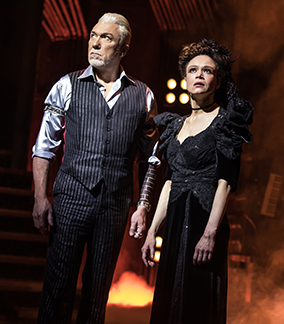
The Hell superbly created by Mitchell and Chavkin is peopled by workers in leather overalls and goggles. They appear as miners wielding pick axes or as fireman stoking a furnace. They are covered in grime and sweat.
We hear Hades (Patrick Page) declare: “I got a wall to build, I got riots to quell.”
But Persephone (Amber Gray) rebukes him: “Lover what have you become? Coal cars and oil drums/ Warehouse walls and factory floors/ I don‘t know you anymore / And in the meantime up above / The harvest dies and people starve / Oceans rise and overflow workers & fates / It ain‘t right and it ain‘t natural.”
The young Eurydice (Eva Noblezada) is poor and hungry. So, a ready victim for Hades, who represents corporate evil.
The workers are a jazzy rap-style Greek chorus.
I include a lot of the text to show how significant it is in the play.
Hades: “Why do we build the wall?
My children, my children
Why do we build the wall?
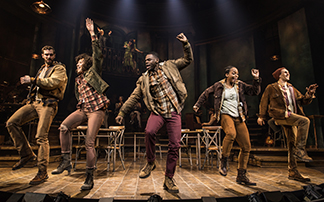
Workers, Fates & Persephone: Why do we build the wall?
We build the wall to keep us free
That‘s why we build the wall
We build the wall to keep us free
Hades: How does the wall keep us free?
My children, my children
How does the wall keep us free?
Workers, Fates & Persephone:
How does the wall keep us free?
The wall keeps out the enemy
And we build the wall to keep us free
That‘s why we build the wall
We build the wall to keep us free
Hades: Who do we call the enemy?
My children, my children
Who do we call the enemy?
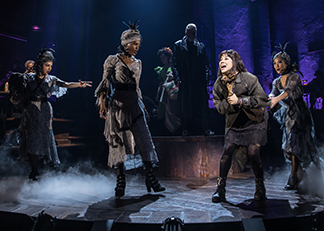
Workers, Fates, & Persephone:
Who do we call the enemy?
The enemy is poverty
And the wall keeps out the enemy
And we build the wall to keep us free
That‘s why we build the wall
We build the wall to keep us free
Hades: Because we have and they have not!
My children, my children
Because they want what we have got!
Workers, Fates & Persephone:
Because we have and they have not
Because they want what we have got
And then Hades:
What do we have that they should want?
my children, my children?
What do we have that they should want?
Workers, fates & Persephone:
What do we have that they should want?
We have a wall to work upon.
We have work and they have none.
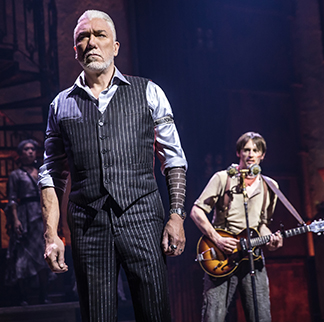
When Orpheus (Reeve Carney) arrives searching for Eurydice, Hades tells him he doesn‘t belong.
“These are working people, son Law-abiding citizens. Go back to where you came from. You‘re on the wrong side of the fence …One of the unemployed…. Everything and everyone in Hadestown I buy.”
Hmmm, could be a migrant. He is attacked, beaten.
But the workers are listening.
Orpheus declares: The ones who tell the lies
Are the solemnest to swear
And the ones who load the dice
Always say the toss is fair
And the ones who deal the cards deal the cards
Are the ones who take the tricks
With their hands over their hearts
While we play the game they fix”
The workers: “We‘re standin‘ with him.”
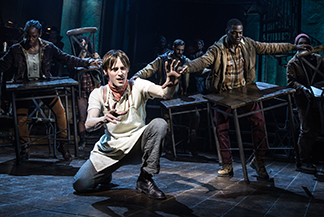
And Orpheus says: “I believe that there is a way
I believe in us together
More than anyone alone
He declares: “I believe we‘re stronger than they know
I believe that we are many
I believe that they are few
And it isn‘t for the few to tell the many what is true.”
But Hades tells his wife Persephone:
“Give them a piece and they‘ll take it all
Show them the crack and they‘ll tear down the wall
Lend them an ear and the kingdom will fall
The kingdom will fall for a song.”
Mitchell provides a new political explanation for why Hades orders that Eurydice and Orpheus can leave Hell only if they go single file and she doesn‘t look back.
Hermes (Andre De Shields), the messenger of the gods and conductor of souls to the Underworld, explains:
“Why build walls?
Make folks walk single file?
Divide and conquer‘s what it‘s called.”
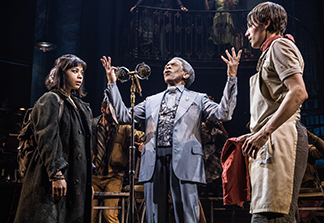
“It‘s a trial.
Do you trust each other?
Do you trust yourselves?”
Hermes says: “Well, listen brother
If you wanna walk outta Hell
You‘re gonna have to prove it
Before gods and men.”
And the workers chant:
“Show the way so we can see
Show the way the world could be
If you can do it so can she
If she can do it so can we
Show the way the world could be
Show the way so we believe
We will follow where you lead”
But the Fates, goddesses who determine the destinies of mortals,
challenge him:
“Who are you to lead them?
Who are you
To think that you can
Hold your head up higher than your fellow man?”
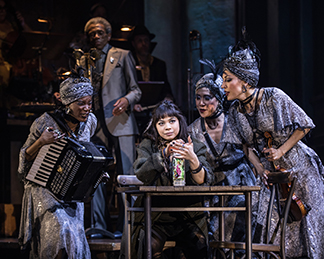
And Hermes warns:
“You got a lonesome road to walk
And it ain‘t along the railroad track
And it ain‘t along the blacktop tar
You‘ve walked a hunnert times before
I‘ll tell you where the real road lies
Between your ears, behind your eyes
That is the path to paradise
Likewise the road to ruin”
This play is a vivid parable of workers‘ struggle for liberation from the few who keep them down, a struggle that starts with their consciousness of oppression and the fight for the liberation of their minds.
Now, note how reviews of the play in the mainstream media ignored those ideas. How do you traduce a play, destroy its underlying purpose? You ignore the ideas and focus on the visuals. See the NY Times, New Yorker, Washington Post.
Ironically, the Wall Street Journal, the iconic voice of capitalism, deals albeit briefly with the real story. Critic Terry Teachout says, “In Ms. Mitchell‘s updated version, a sordid Depression-era New Orleans nightclub is the hellmouth and Hades is the slave-driving factory owner to whom the poverty-stricken Eurydice has unwittingly sold her body and soul.” No more, but that‘s a lot more than his colleagues.
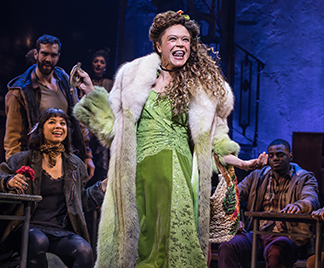
Of course, “Hadestown” is also a superb musical with sounds of New Orleans jazz, folk rock, Latin rhythms (the terrific Fates‘ dance “When the chips are down”), and sometimes early Dylan style. With fine choreography by David Neumann that is acrobatic, expressive, earthy, jazzy.
Eva Noblezada as Eurydice has a na¯ve little girl, ingénue look and an excellent rich alto, sometimes a country or blues sound.
Amber Gray as Persephone is a smashing torch singer, doing a raunchy dance in bumps and grinds. Andrei de Shields as Hermes has a rich voice and struts in his silver suit like an ethereal sprite.
Jewelle Blackman brings a jazzy blues spirit to the Fates. Patrick Page as Hades stands out with a fine deep bass. Reeve Carney as Orpheus is like a 1960s flower child, nothing magical about him, and I didn‘t like his falsetto.
The play is staged on wood risers and rising platforms and turntables. It‘s visually exciting. But it is politically thrilling.
“Hadestown.” Music, lyrics and book by Ana¯s Mitchell; developed and directed by Rachel Chavkin. Walter Kerr Theatre, 219 West 48th Street, New York City. 877-250-2929. Online lottery for cheap seats. Opened April 17, 2019. Runtime 2:30. 6/18/19. Also on NY Theatre Wire.


Thank you for the wonderful review!
I have been listening to the soundtrack and agree that the themes are worker oppression, destruction of the environment and materialism.
The reason other reviews don‘t highlight these themes is to sell tickets for the tour. Many people would not see the show if they knew what it was really about. The great plutocracy rules America.
Glad you understood this play better than most reviewers!